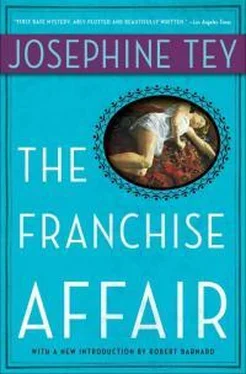“You travel for your firm,” Kevin said.
“Yes.”
“In March of this year did you pay a visit to Larborough?”
“Yes.”
“While you were in Larborough did you meet Betty Kane?”
“Yes.”
“How did you meet her?”
“She picked me up.”
There was an instant and concerted protest from the body of the court. Whatever discrediting Rose Glyn and her ally had suffered, Betty Kane was still sacrosanct. Betty Kane, who looked so much like Bernadette, was not to be spoken of lightly.
The judge rebuked them for the demonstration, involuntary though it had been. He also rebuked witness. He was not quite clear, he inferred, what “picking up” involved and would be grateful if the witness would confine himself to standard English in his replies.
“Will you tell the Court just how you did meet her,” Kevin said.
“I had dropped into the Midland lounge for tea one day, and she – er – began to talk to me. She was having tea there.”
“Alone?”
“Quite alone.”
“You did not speak to her first?”
“I didn’t even notice her.”
“How did she call attention to her presence, then?”
“She smiled, and I smiled back and went on with my papers. I was busy. Then she spoke to me. Asked what the papers were, and so on.”
“So the acquaintance progressed.”
“Yes. She said she was going to the flicks – to the pictures – and wouldn’t I come too? Well, I was finished for the day and she was a cute kid so I said yes, if she liked. The result was that she met me next day and went out to the country in my car with me.”
“On your business trips, you mean.”
“Yes; she came for the ride, and we would have a meal somewhere in the country and tea before she went home to her aunt’s place.”
“Did she talk about her people to you?”
“Yes, she said how unhappy she was at home, where no one took any notice of her. She had a long string of complaints about her home, but I didn’t take much notice of them. She looked a pretty sleek little outfit to me.”
“A what?” asked the judge.
“A well-cared-for young girl, my lord.”
“Yes?” Kevin said. “And how long did this idyll in Larborough persist?”
“It turned out that we were leaving Larborough on the same day. She was going back to her people because her holiday was over – she had already extended it so that she could run about with me – and I was due to fly to Copenhagen on business. She then said she had no intention of going home and asked me to take her with me. I said nothing doing. I didn’t think she was so much of an innocent child as she seemed in the lounge at the Midland – I knew her better by that time – but I still thought she was inexperienced. She was only sixteen, after all.”
“She told you she was sixteen.”
“She had her sixteenth birthday in Larborough,” Chadwick said with a wry twist of the mouth under the small dark moustache. “It cost me a gold lipstick.”
Robert looked across at Mrs. Wynn and saw her cover her face with her hands. Leslie Wynn, sitting beside her, looked unbelieving and blank.
“You had no idea that actually she was still fifteen.”
“No. Not until the other day.”
“So when she made the suggestion that she should go with you you considered her an inexperienced child of sixteen.”
“Yes.”
“Why did you change your mind about her?”
“She – convinced me that she wasn’t.”
“Wasn’t what?”
“Inexperienced.”
“So after that you had no qualms about taking her with you on the trip abroad?”
“I had qualms in plenty, but by then I had learned – what fun she could be, and I couldn’t have left her behind if I had wanted to.”
“So you took her abroad with you.”
“Yes.”
“As your wife?”
“Yes, as my wife.”
“You had no qualms about any anxiety her people might suffer?”
“No. She said she still had a fortnight’s holiday to come, and that her people would take it for granted that she was still with her aunt in Larborough. She had told her aunt that she was going home, but had told her people that she was staying on. And as they never wrote to each other it was unlikely that her not being in Larborough would become known to her people.”
“Do you remember the date on which you left Larborough?”
“Yes; I picked her up at a coach stop in Mainshill on the afternoon of March the 28th. That was where she would normally have got her bus home.”
Kevin left a pause after this piece of information, so that its full significance should have a chance. Robert, listening to the momentary quiet, thought that if the courtroom were empty the silence could not be more absolute.
“So you took her with you to Copenhagen. Where did you stay?”
“At the Red Shoes Hotel.”
“For how long?”
“A fortnight.”
There was a faint murmur of comment or surprise at that.
“And then?”
“We came back to England together on the 16th of April. She had told me that she was due home on the 16th. But on the way over she told me that she had actually been due back on the 11th and would now have been missing for four days.”
“She misled you deliberately?”
“Yes.”
“Did she say why she had misled you?”
“Yes. So that it would be impossible for her to go back. She said she was going to write to her people and say that she had a job and was quite happy and that they were not to look for her or worry about her.”
“She had no compunction about the suffering that would cause parents who had been devoted to her?”
“No. She said her home bored her so much she could scream.”
Against his will, Robert’s eyes went to Mrs. Wynn, and came away again at once. It was crucifixion.
“What was your reaction to the new situation?”
“I was angry to begin with. It put me in a spot.”
“Were you worried about the girl?”
“No, not particularly.”
“Why?”
“By that time I had learned that she was very well able to take care of herself.”
“What exactly do you mean by that?”
“I mean: whoever was going to suffer in any situation she created, it wouldn’t be Betty Kane.”
The mention of her name suddenly reminded the audience that the girl they had just been hearing about was “the” Betty Kane. “Their” Betty Kane. The one like Bernadette. And there was a small uneasy movement; a taking of breath.
“So?”
“After a lot of rag-chewing–”
“Of what?” said his lordship.
“A lot of discussion, my lord.”
“Go on,” said his lordship, “but do confine yourself to English, standard or basic.”
“After a lot of talk I decided the best thing to do would be to take her down to my bungalow on the river near Bourne End. We used it for weekends in the summer and for summer holidays, but only rarely for the rest of the year.”
“When you say ‘we,’ you mean your wife and you.”
“Yes. She agreed to that quite readily, and I drove her down.”
“Did you stay there with her that night?”
“Yes.”
“And on the following nights?”
“The following night I spent at home.”
“In Ealing.”
“Yes.”
“And afterwards?”
“For a week after that I spent most nights at the bungalow.”
“Was your wife not surprised that you did not sleep at home?”
“Not unbearably.”
“And how did the situation at Bourne End disintegrate?”
“I went down one night and found that she had gone.”
“What did you think had happened to her?”
“Well she had been growing very bored for the last day or two – she found housekeeping fun for about three days but not more, and there wasn’t much to do down there – so when I found she had gone I took it that she was tired of me and had found someone or something more exciting.”
Читать дальше
Конец ознакомительного отрывка
Купить книгу












